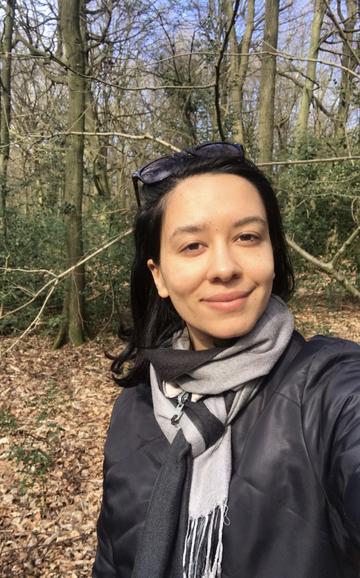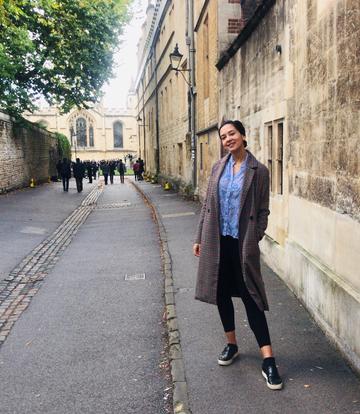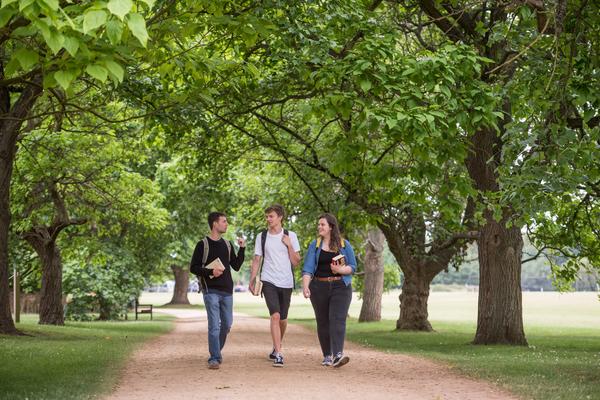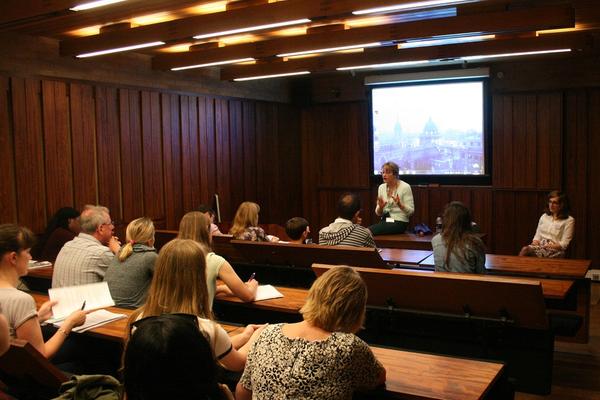Niluka Kavanagh
Spotlight on Alumni

“I take the, Margery, for my weddyd wyfe, for fowelar, for richar, for powerar, so that thu be buxom and bonyr to do what I byd the do”.
This is just one of many transcendental lines in The Book of Margery Kempe, the earliest surviving autobiography in English (dated 1436-8). God is “marrying” Margery, an extraordinary fifteenth-century Norfolk woman who wore many hats during her life: housewife, mother, pilgrim, prophet and visionary. The book is a tale of convergence between the blurred lines of reality and spirituality, between Margery’s “bodily” and “ghostly” eye. This is a book that has stayed with me even after I left Oxford, being so unusual and compelling in origin and content.
When I look back at Oxford, the words that could best describe my degree are variety and opportunity. I undertook Course II, Old and Middle English, which meant exploring the earliest literature. This included everything from Beowulf and various Saints Lives to Margery Kempe and Piers Plowman. I also focused on the language side of my degree – from gender and words, to the history and evolution of advertising in Vogue magazines. I explored two extremes of English: old and new, literature and linguistics. Variety and the opportunity to learn something new were everywhere.
Discovering Oxford
I first “discovered” Oxford on a school trip when I was 14. I was captivated by the city, the strange possibilities and beautiful architecture. But most importantly, it was a place where reading books was an enjoyable pleasure, where the discovery of a new word or line in a poem would genuinely excite people, much in the same way it did me. I knew then that it was a place where I wanted to study.
When I first applied almost five years later, I didn’t tell my parents. My mother came to Britain from Sri-Lanka in 1984 and my father was raised in a council house in Lancashire. Both are from humble beginnings and to them Oxford University was no doubt a distant, far off place, created only for a privileged subset of society. But my secret didn’t last long when I was called to Oxford interviews. I needed a lift and public transport didn’t look too appealing, so I hesitantly told them about my application. When eventually I received an offer – and then confirmation of my place – it was one of the happiest moments of my life, and theirs, too.

My career today
Fast forward to today and I now pursue a fulfilling and challenging career. I work in Brand, Customer and Marketing Strategy for KPMG UK and have been there almost 4 years. I have had the opportunity to work on a number of different projects – from creating new and interesting customer experiences, to understanding the drivers behind brand value. When it comes to brand strategy, how companies communicate and connect with their customers is critical, especially in a world where authentic communication and trust is highly demanded. Communication is a key part of brand building.
Outside of KPMG, I am also the founder of HelpMePresent, a 1-1 virtual coaching platform that aims to democratise public speaking (I call this the “tutoring of presenting”). The content and structure of any presentation is especially important. I will never forget Professor Deborah Cameron’s lecture on the differences between speech and writing, which I still use in my coaching today. Finally, I also am a writer and post articles on my website www.nilukakavanagh.com. On this site, I take time to indulge in poetry too, writing poems that are shaped by feelings, inspired by moments. It’s fair to say that English – and indeed words – remain a big part of my life.
A place that shaped me
Studying English Literature and Language at Oxford helped shape me into who I am today. It taught me how to think critically and to deconstruct even the simplest of ideas. It taught me to always ask “why?”, creating an innate curiosity that has followed me from degree to career.
It also taught me that variety is essential, that variety is the very richness in life that keeps our minds and spirits alive. One day at university, I was studying Margery Kempe as she “cryed ful lowde and horybly”, the next day deconstructing emojis used within 21st century text modern exchanges. Today, with my student days now over, I might be helping a client design a new customer proposition, taking a quiet moment to write a poem on the magic of love, or helping coach a student on effective presenting.
Margery Kempe was a woman who wore many hats and I like to think I do too, morphing from businesswoman to presentation coach to writer. If there’s one thing Oxford taught me, it is that you have the opportunity to be your unique self, to create your very own recipe of variety, and to remain constantly curious.
As I wrote in a recent poem:
A little bravery is key
To give oneself new colours to see
Although it’s easy to just be
I strive for
The better version of me
© Niluka Kavanagh






